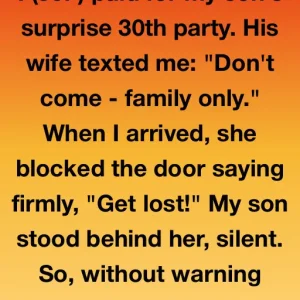I wasn’t ready to say goodbye—not really. People said the end would be peaceful, and maybe it was for Lily. For me, it was a cliff. The week before her funeral blurred into antiseptic corridors, beeping monitors, whispered prayers, and the small, stubborn hope that refused to die even as my little girl did. Today we put her in the ground. I moved through the service like a ghost. Faces came and went—neighbors, cousins, kind people with casserole voices—offering the same tender words that slid off me like rain. I nodded, thanked, hugged when hugged, and kept my eyes on the empty space where my daughter should have been.
The drive home was silent. No radio, no talk. Grief makes you superstitious; you start to believe that quiet can hold the world still, the way a hand can still a trembling glass. I pulled into the driveway and sat for a moment gripping the steering wheel, gathering the courage to walk into a house that suddenly felt too large for one person’s heart.
Then I saw it. A tent in the backyard.
Not the kind you toss in a trunk for a weekend. This was big and bright—carnival stripes, little flags hiccuping in the breeze. For a second I thought I was imagining it, the mind slipping from sorrow into something unstable. But it didn’t dissolve when I blinked. It stood there, cheerful and impossible in my grief-drained yard.
I got out of the car on legs that didn’t trust me. Who would do this, and why today of all days? The closer I walked, the more real it became: the stitched seams in the fabric, the stakes driven into the cold ground, the flap tied loosely like a mouth waiting to speak. There was no note, no explanation, just color against my grayness. I reached for the flap. My hand trembled. I didn’t want any more surprises. I lifted it anyway.
At first I saw only a bundle in the center—small, wrapped in a blanket. My stomach dropped. Memory crashed in: Lily swallowed by hospital covers, her bird-boned hands disappearing in the sheets, the quiet that rattled louder than any alarm. I whispered “no” without sound. Then the bundle moved.
A tiny head popped free: a Labrador puppy, honey-colored and blinking, with a pink bow crooked under one ear. It looked at me like I was the miracle. It wobbled on unsteady legs and butted my knee with its warm nose, tail punctuating the cold air. I knelt without meaning to. The fur under my palm was soft, alive, defiant. Life, in a place I’d come to expect only endings.
“Where did you come from?” I asked the air, my voice frayed. The puppy answered with a small, hopeful whine and planted itself on my feet like they belonged to it.
That’s when I saw the envelope, tucked beneath the blanket. The handwriting on the front made my breath hitch—looping, messy, familiar. Lily’s letters, stubborn and proud, the way she’d address birthday cards and tape them to the fridge because “mail should feel important.”
My fingers shook as I opened it.
Dear Mommy,
I know you’re sad because I had to go to heaven. But I wanted to leave you something to help you smile again. I asked Daddy to get you a puppy, so you’ll have someone to cuddle with when you’re missing me. Her name is Daisy, and she loves to play! Please take care of her for me. I’ll always be with you, watching from above. I love you so much.
Love, Lily.
I sank to my knees hard enough to feel it in my bones and pressed the paper to my chest. The sobs that wouldn’t come at the cemetery ripped free now—ugly, grateful, unstoppable. The puppy—Daisy—clambered into my lap as if she’d rehearsed this exact scene, licking tears like she could drink them down.
Even at the end, my child had been thinking of me. Lily knew the shape of the hole I’d be left with. She found a way to tuck light into it.
The tent stopped feeling absurd. It felt like a doorframe—something you pass through to step into what comes next. I gathered the blanket and the letter, scooped Daisy against my coat, and carried us all inside. In the kitchen I found myself moving on muscle memory: bowl, water, a few crackers crumbled small while I Googled “what can puppies eat” with the stunned practicality grief sometimes grants. Daisy devoured, then curled at my ankle with a sigh so big it seemed borrowed from an old dog. I sat on the floor beside her and let the quiet fill with a new sound: soft breathing that wasn’t mine.
The days that followed didn’t magically soften. Grief didn’t yield because I had a warm body in the house. But Daisy didn’t give me the option to sink without movement. She needed to be fed and walked and let out and let in. She needed to chase a sock and fail to catch it. She needed to curl under my hand at night like a question mark answering itself. When I stalled at the edge of the bed, she nosed my shin until I stood. When the afternoon slumped heavy, she pressed her paw to my palm as if swearing me in to a small, manageable promise: just one more hour together.
I started saying Lily’s name out loud to the dog. We looked at photos. I told Daisy the stories I was afraid would fade: the day Lily decided umbrellas were “sky spoons,” the time she insisted our groceries needed a lullaby on the drive home, how she’d run back to kiss the mailbox because “mail helps people feel remembered.” Daisy listened in the way only dogs can—head tilted, eyes bright, presence absolute. Sometimes I swear she’d run to the back door and glance toward the yard, as if she, too, remembered the tent and understood that beginnings sometimes arrive dressed like endings.
People talk about replacement when they talk about pets after a loss. Daisy never felt like that. She felt like an assignment. Lily’s last piece of mischief and mercy. A reminder that love is a verb that needs a body to practice on: a leash clipped, a bowl rinsed, a walk taken even when the sky is tired. Care turned out to be a stubborn kind of faith. If I kept doing it, the world kept happening.
I keep Lily’s letter in a frame on the hallway table. Some mornings I touch the glass the way I used to smooth her hair off her forehead. On the worst days, I sit on the back steps with coffee that goes cold while Daisy patrols the fence line with professional seriousness. The grass has a faint rectangle where the tent once stood, and in that patch I plant things Lily liked to draw—daisies, of course, and zinnias that look like fireworks holding their breath. When the wind lifts, the flowers nod like a row of small, emphatic yeses.
Grief is not a straight road. It doubles back, lies in wait at the bottom of a song, ambushes you in the candy aisle. But now it has to share the house. It has to move over for paw prints and chewed squeakers, for leashes that rattle like joy, for a life that refuses to dim on command. At night, Daisy drops into sleep with the full confidence of a creature convinced morning will return. Some part of me is learning to believe her.
Lily gave me one last impossible gift: a reason to get up, an anchor that barks, a small heartbeat to keep time when mine stutters. The hole in me is still a hole. But around its edges, something is growing—messy and persistent and alive. I think my daughter would like that. I think she planned it that way.





